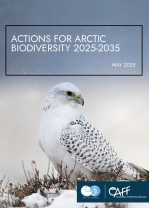
CAFF Releases at the 14th meeting of the Arctic Council
2025-05-27
CAFF Deliverables at 14th Arctic Council Ministerial
 Following the 14th Arctic Council Ministerial Meeting, the Conservation of Arctic Flora and Fauna (CAFF) Working Group released several deliverables developed during the 2021–2025 period. These outputs reflect CAFF’s ongoing work to support biodiversity monitoring, conservation planning, and collaboration with Indigenous Peoples and other Arctic Council Working Groups.
Following the 14th Arctic Council Ministerial Meeting, the Conservation of Arctic Flora and Fauna (CAFF) Working Group released several deliverables developed during the 2021–2025 period. These outputs reflect CAFF’s ongoing work to support biodiversity monitoring, conservation planning, and collaboration with Indigenous Peoples and other Arctic Council Working Groups.
 Complementing this, CAFF also released its 2025–2027 Work Plan, which outlines the projects and activities planned under the upcoming Icelandic Chairship. The work plan is informed by the new Actions for Arctic Biodiversity strategy and includes initiatives across monitoring, data management, youth engagement, and cross-working group collaboration.
Complementing this, CAFF also released its 2025–2027 Work Plan, which outlines the projects and activities planned under the upcoming Icelandic Chairship. The work plan is informed by the new Actions for Arctic Biodiversity strategy and includes initiatives across monitoring, data management, youth engagement, and cross-working group collaboration.
Additional deliverables include:
-
Information Briefs on the Arctic Marine Environment Under Change, developed in cooperation with the Protection of the Arctic Marine Environment (PAME) Working Group, address ecological connectivity and invasive alien species. These briefs synthesize current knowledge on how climate change and human activity are affecting Arctic marine ecosystems.
-
The Marine Invasive Alien Species Report, also a joint effort with PAME, compiles data on non-indigenous species in Arctic waters. It reviews risk assessment methods related to ballast water and biofouling and outlines future monitoring and mitigation strategies.
-
The Other Effective Area-based Conservation Measures (OECMs) Report, produced in collaboration with PAME, explores conservation tools that complement traditional protected areas. It contributes to the development of a more comprehensive network of conservation measures in Arctic marine environments.
-
The Salmon Peoples Workshop Report documents perspectives from Indigenous Knowledge holders on the cultural and ecological significance of salmon. The report highlights the role of salmon as indicators of ecosystem health and the importance of supporting the resilience of communities that depend on them.
-
The Nordic Coastal Workshop Report supports regional implementation of the Circumpolar Biodiversity Monitoring Program (CBMP) Coastal Plan. It includes coastscape mapping for Greenland, Iceland, and Norway, and provides data to inform coastal biodiversity assessments.
-
The Status and Trends for Arctic Conservation Measures Report, developed in cooperation with PAME, offers a summary of conservation efforts across the region, identifying progress and areas for further attention.
-
A contribution titled Connecting SIKU Indigenous Biodiversity Observations to CAFF Global Reporting was authored by Josh Komangapik, the first CAFF Arctic Indigenous Canadian Youth Fellow. This initiative, part of a Canadian youth engagement program, explores how Indigenous-led observations using the SIKU platform can be integrated into CAFF’s global biodiversity reporting systems. The work was developed with the understanding that any use of SIKU data or community-contributed knowledge must be done with explicit permission from SIKU or the contributing communities, in accordance with ethical data governance principles.
These deliverables are intended to support evidence-based decision-making and long-term conservation planning in the Arctic. They reflect CAFF’s continued focus on biodiversity monitoring, data integration, and collaboration with Indigenous Peoples and other Arctic Council Working Groups.
 Arctic Council Working Group
Arctic Council Working Group 